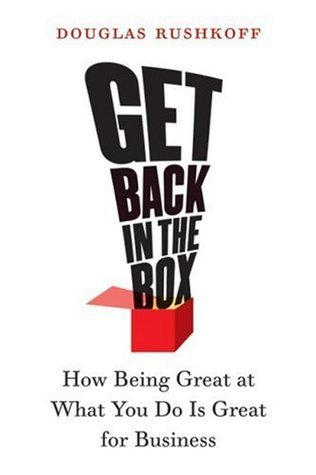Douglas Rushkoff's business advice book focusses on a central theme that business spend too much time and energy trying to solve their problems by doing other unexpected things rather than just doubling down on doing their core business well.
The book starts well, with a thumbnail sketch of a bad business book - disaster, solution, case study, case study, repeat ad nauseam. This opening immediately disposed me well to the book because I have read and failed to respect or enjoy several books in that format. Sadly, rushkoff doesn't truly escape the problem he describes - ultimately he is a consultant too, and a big part of his book are case-study like anecdotes and a proposal for how to do things differently.
It is immediately evident from the text that Rushkoff is an engaging, interesting person and probably a compelling public speaker. He is able to connect together disparate themes and ideas, deploy insightful (or insightful-sounding) thoughts and tell engaging stories about situations. There's a lot to enjoy about the way this book is written, and quite a few interesting anecdotes spread throughout it.
Though this book was written in 2005, one of the most refreshing things about it is that Rushkoff is an information-age writer, and so has an instinctive grasp of the societal changes being wrought by technology and the broader and deeper changes being driven by them. Compared to other business books I really liked this aspect.
Unfortunately, Rushkoff doesn't hit home with the core of his argument. He is certainly able to talk in depth about situations where a business failed to remain focused on their core business, and suffered as a result. He doesn't seem to look very hard for situations that disprove his thesis, suffering from the same evidentiary selectivity that he rightly criticises focus groups for suffering from. And he even walks right past quite obvious holes in his argument. He chides Polaroid for losing sight of their core competency, but it is very clear that this business was for sure going away, so they had to move at least a bit outside of their shrinking box.
He is also much better at raising interesting issues than he is at connecting them back to his topic. He raises the energy industry as an example, and is lavish with his praise and criticism of past actions. But when it comes to describing an alternative path all he has are empty metaphors and truisms ("redesigning things from the inside out"). Similarly, he raises open source as a key value - because he thinks competition is overrated vs cooperation. But he uses Costco as an example of open source (vs Wal Mart). Costco does a lot to be impressed by, but I think it's hard to classify their advantage as Open Source collaboration.
He writes a bit about Microsoft and Google. [I work for Microsoft, potential-bias-declaration]. He gets some facts wrong, and I think this is not his strongest topic in support of his major thesis, since Microsoft seems a lot more in-the-box than Google even though Google seems to have indeed succeeded in some of the out-of-the-box ways he describes. But what I found most telling about this section is how he gave Google credit for being open source and collaborative when, even in 2005 they were very competitive and all their core search assets were closed source. I think Rushkoff only knows about some problems from the outside, and isn't quite sceptical enough of his sources.
I have one final example of the unsatisfying nature of this book. He writes a longish section on the troubling history of Details magazine - founded and successful in one category, then bought by Conde Nast and subjected to a sequence of editors and editorial directions none of which worked, before being sold again to another company who after a couple more tries finally made it a success. Details starts out gay-friendly, then as told by Rushkoff tries on various personas - fashionable, general-interest (like GQ), bloke-ish (like Maxim), and more before returning to its gay roots for success. The problem with Rushkoffs interesting story is that looking on, it is really hard to see which of these is 'inside the box'. At one level the return to roots is inside that box. At another, the wilful copying of the most successful titles is very much inside a box too, especially as they hire staff from those other titles. There is no convincing conclusion I can draw from this story, except that the second publisher had less ambitious goals and was satisfied with 500000 readers.
Overall, Rushkoff's book is engaging but not satisfying. It is a reminder of a good adage, without any useful guidance on how or when to apply it. It is full of good stories, but not good conclusions. While it is moderately interesting, but I cannot recommend it to anyone who actually wants business advice. There are better ways to spend your time.

